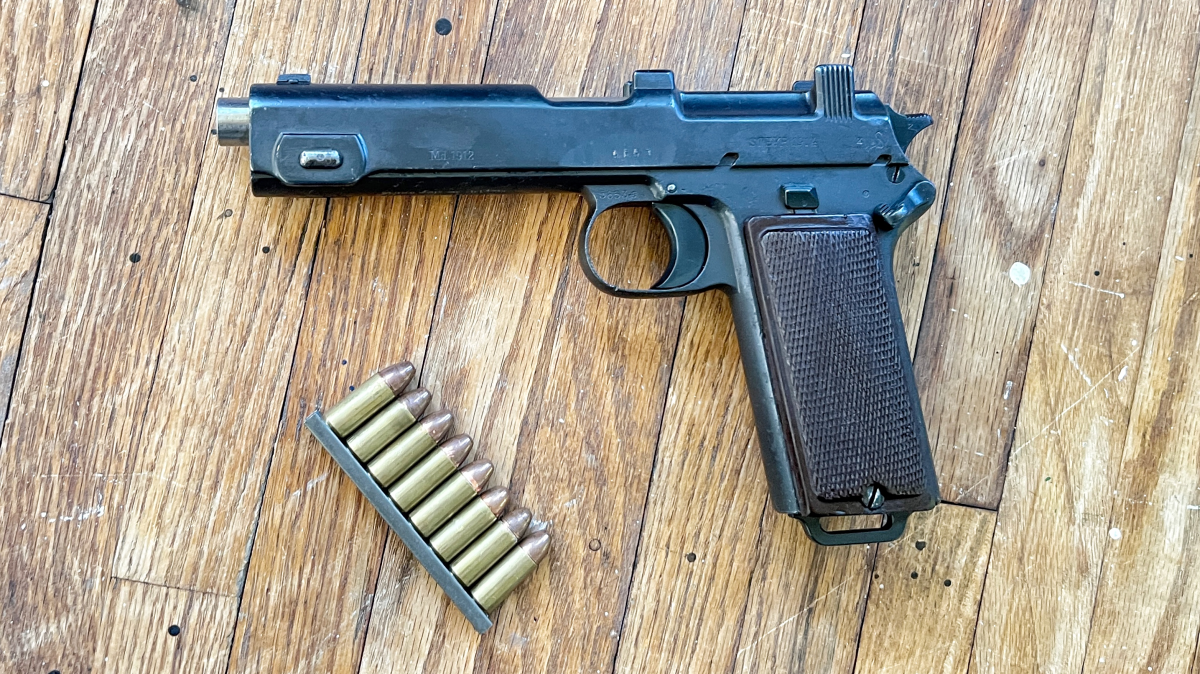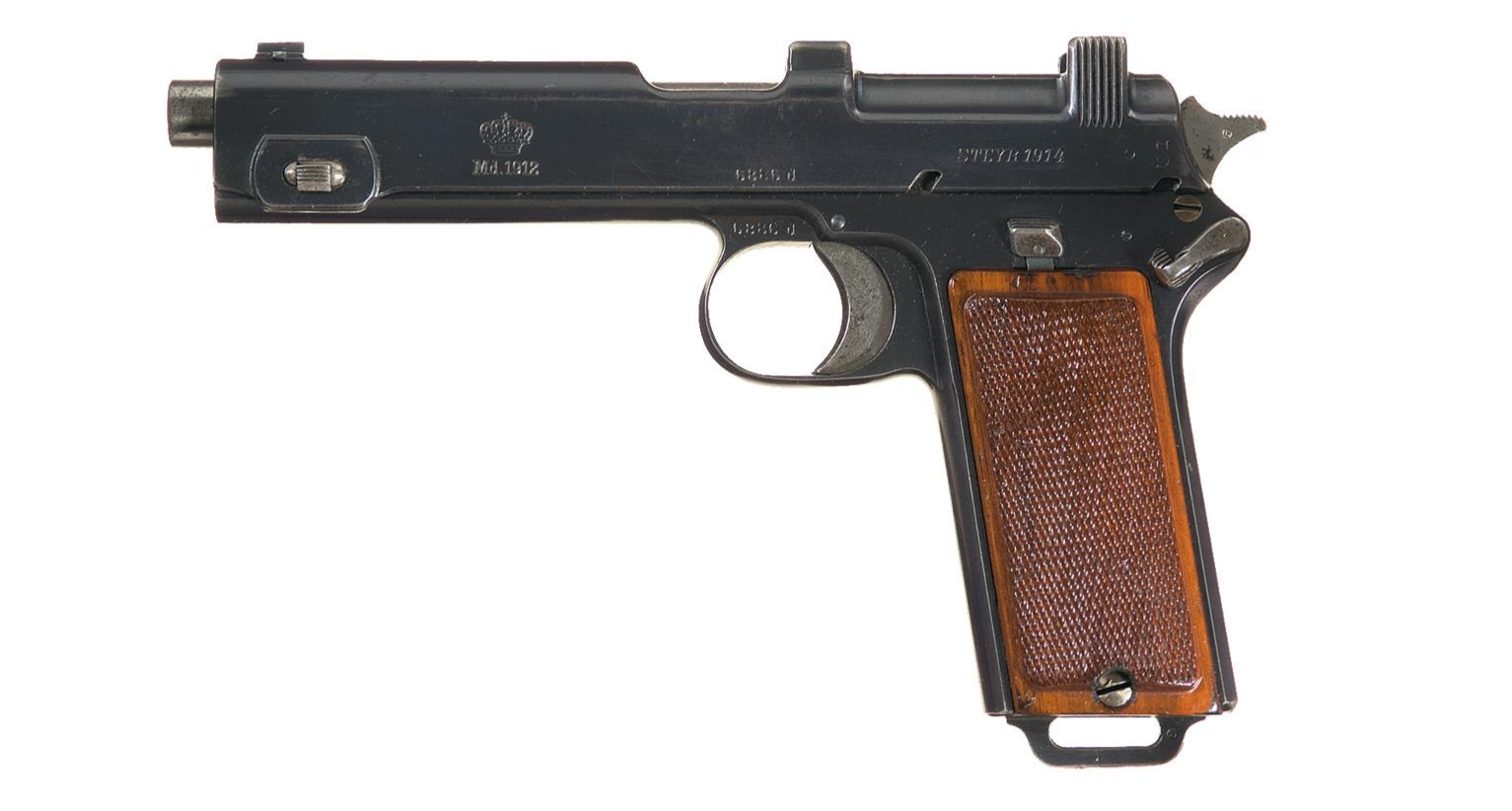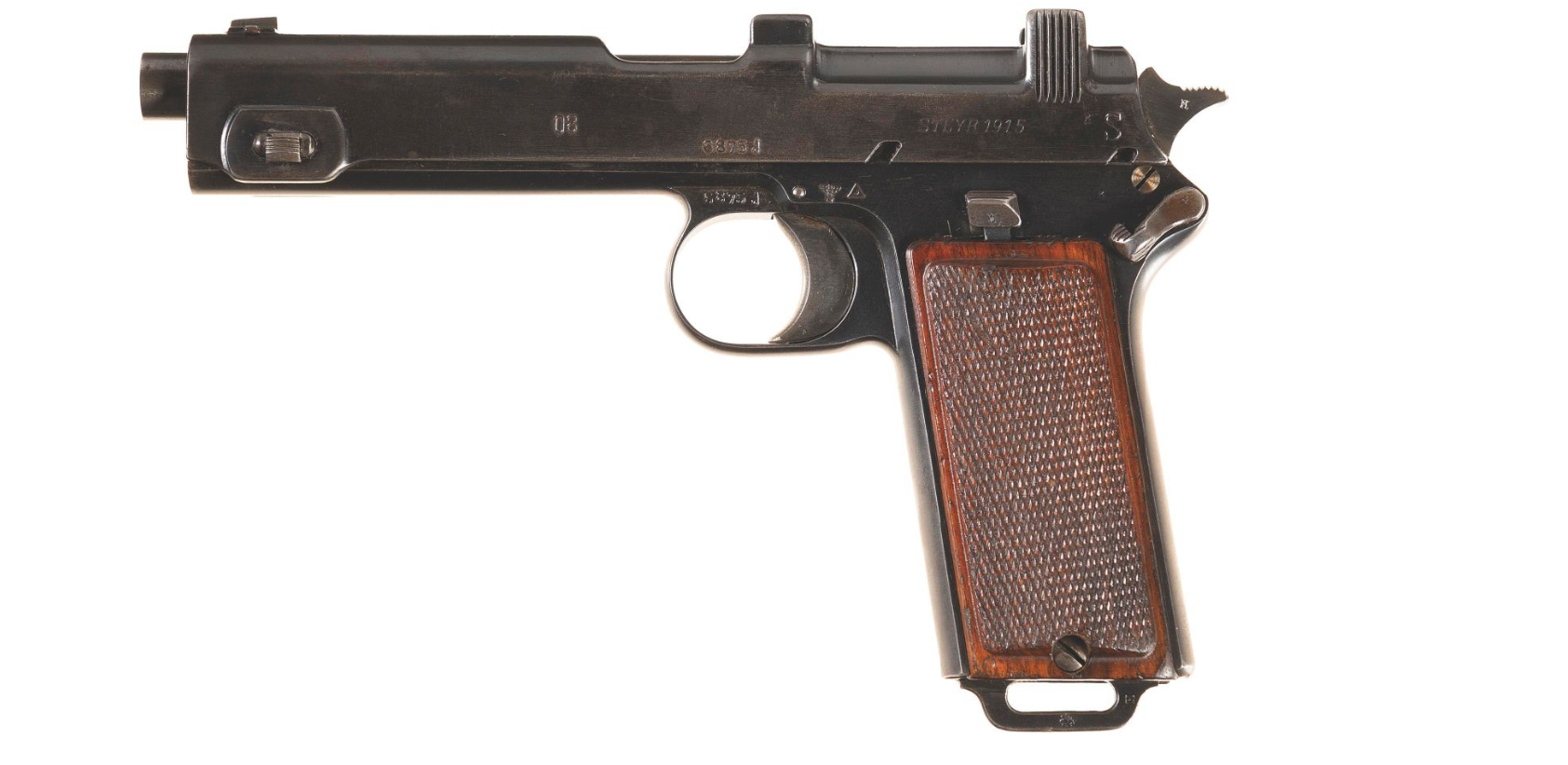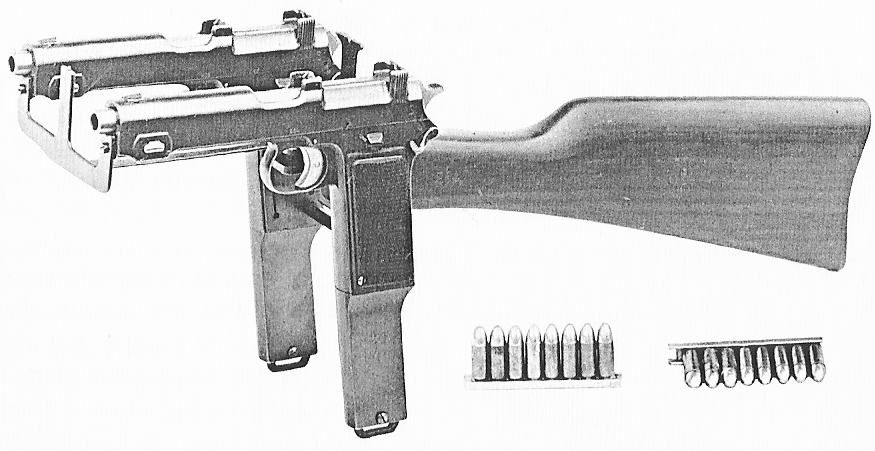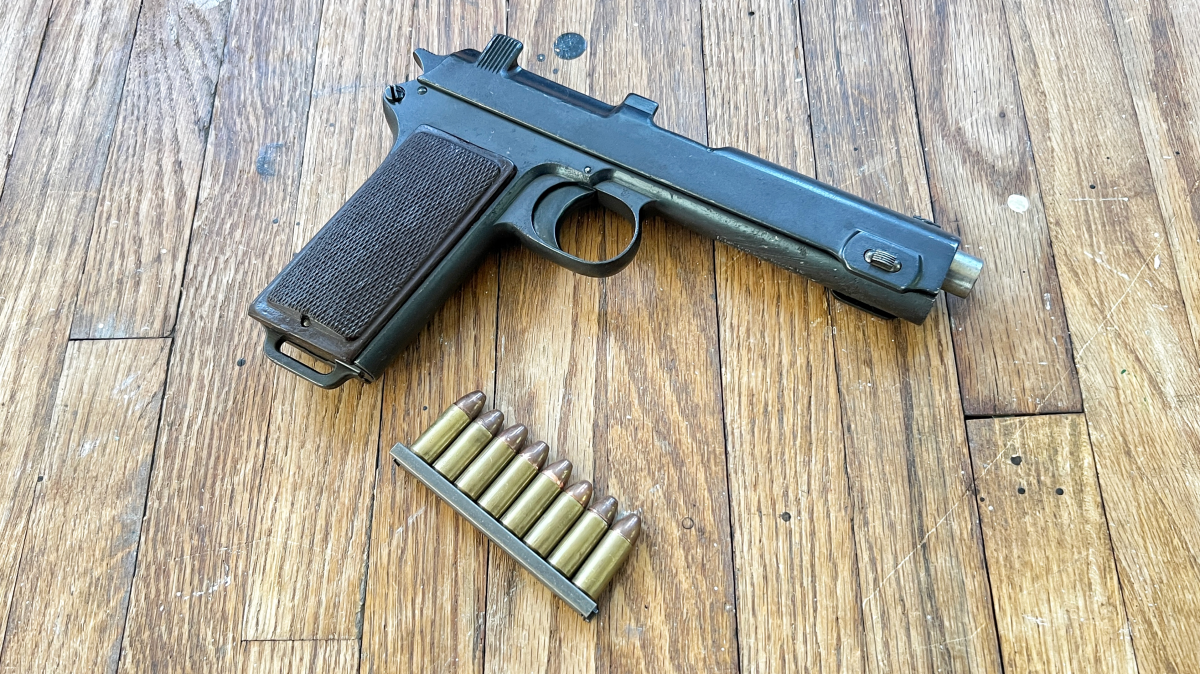Curious Relics #091: There is a Full Auto Steyr 1912?
Sam.S 06.12.24
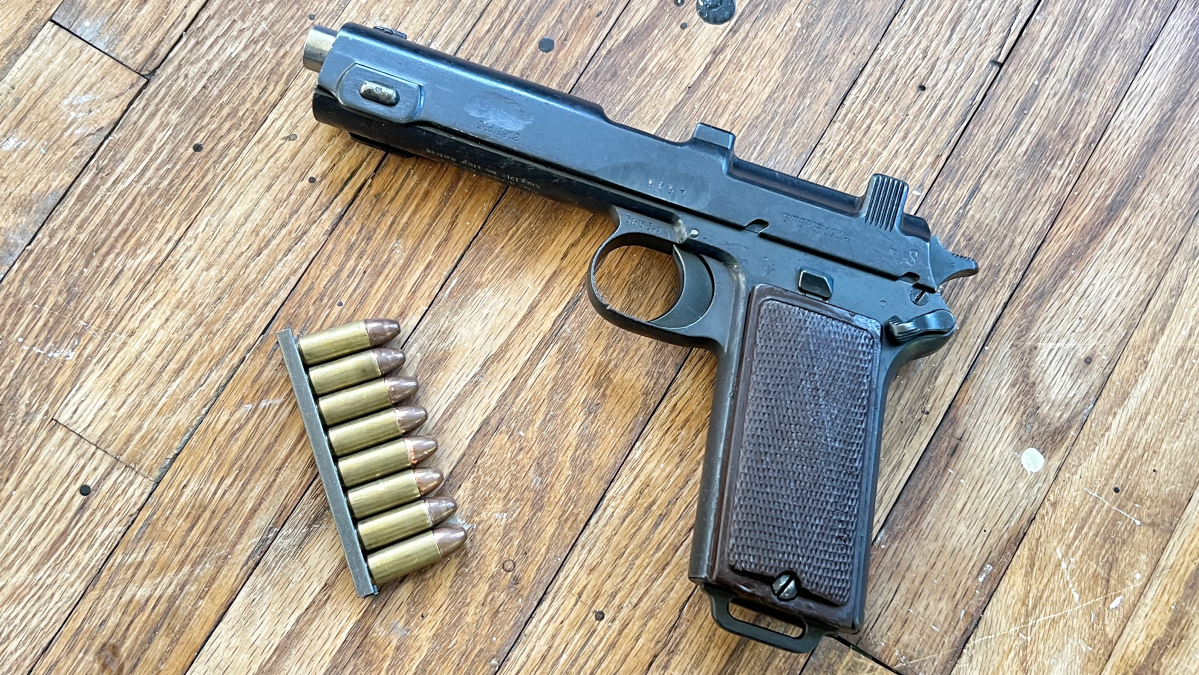
Welcome, if you are a newcomer to this fun bi-weekly segment of AllOutdoor.com! Last time around we dove into the history of one of my favorite World War One era firearms, the Steyr 1912. The Steyr 1912 is an ugly duckling in a vast array of pistols trying to figure out what a real pistol should be. Through its life and service, it really did not see much as far as footprint change however there are still variants to break down. That being said let’s dive right in!
Recent Content in Curious Relics:
- Curious Relics #086: Love at First Sight – The Savage 101
- Curious Relics #087: A Pistol Full of Mysteries – The Savage 101 Part II
- Curious Relics #088: Decidedly Difficult Dating – Savage Model 101 Part III
- Curious Relics #089: Single Six Shooter – Savage Model 101 Part IV
Welcome to our recurring series of “Curious Relics.” Here, we want to share all of our experiences, knowledge, misadventures, and passion for older firearms that one might categorize as a Curio & Relic – any firearm that is at least 50 years old according to the ATF. Hopefully along the way you can garner a greater appreciation for older firearms like we do, and simultaneously you can teach us things as well through sharing your own expertise and thoughts in the Comments. Understanding the firearms of old, their importance, and their development which lead to many of the arms we now cherish today is incredibly fascinating and we hope you enjoy what we have to share, too!
Variations: Steyr 1912
Steyr 1912 (Steyr M1912, Steyr Hahn, Steyr Hammer): Our specific pistol today. Designed in 1911, production began in 1912, and it was adopted by the Austrian military in 1914…after they already rejected it during an earlier submission. Turns out that going to war may make a country less picky. Anyway, roughly 300,000 of these guys were produced from 1912 until 1945. They were chambered for the 9mm Steyr cartridge (dimensionally similar to 9mm Largo but typically way less potent) and it held eight rounds after being top-loaded via stripper clip. Commercial models did exist throughout their production however their sales were mainly military-related.
Chilean Steyr Model 1911: Manufactured from 1912 through 1913. Around 5000 of these were ordered. Almost entirely identical to the Austrian production guns but will not have Austrian proofs. They will have a Chilean crest in between the slide wedge and the serial number on the left-hand side. It will have “MOD. 1911” close by the date of manufacture on the left side as well. On the right side, it will have a Chilean military marking.
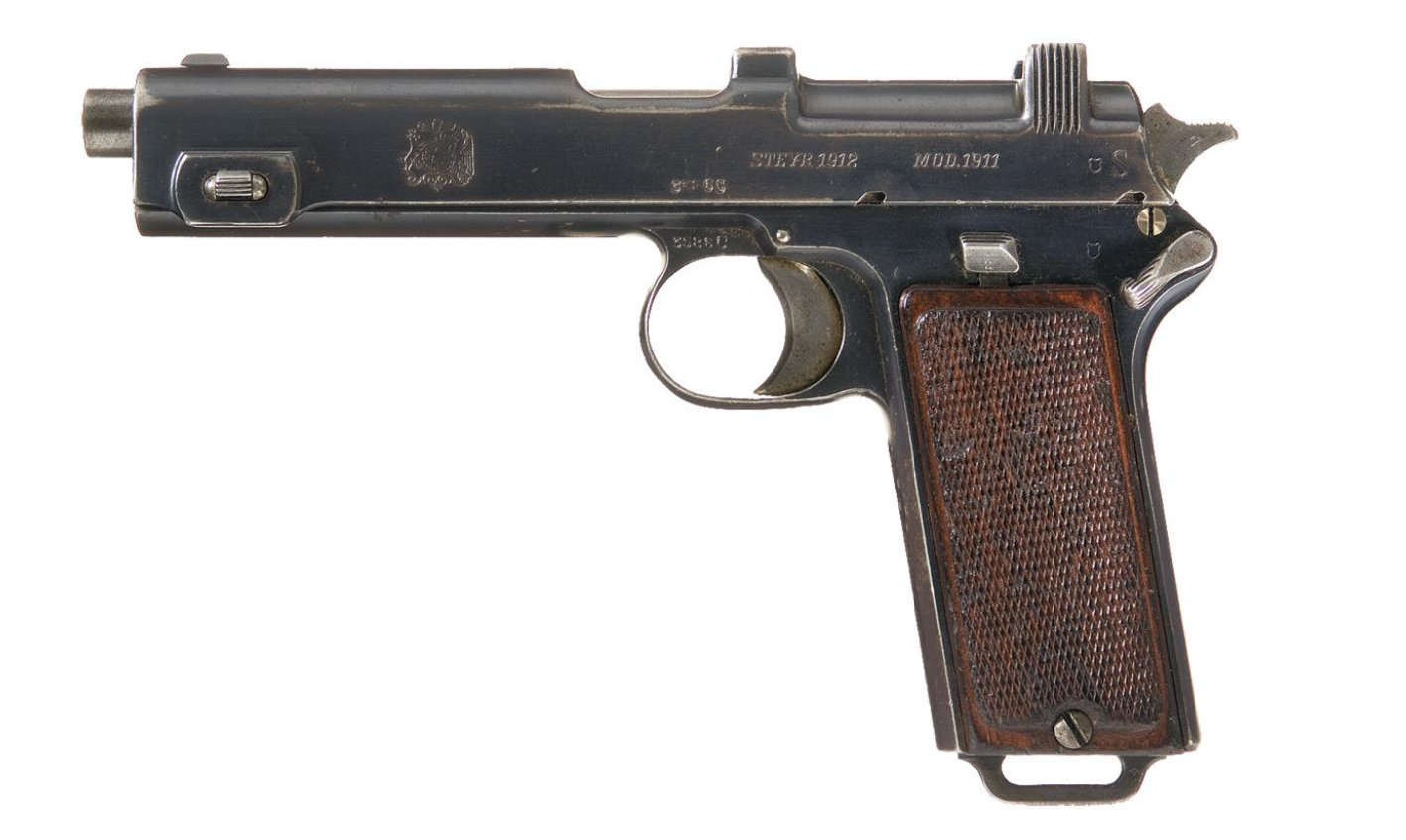
Lot 449: Chilean Contract Steyr Model 1911 Semi-Automatic Pistol. (n.d.-m). Rock Island Auction Company. photograph. Retrieved June 11, 2024, from https://www.rockislandauction.com/detail/47/449/chilean-contract-steyr-model-1911-semiautomatic-pistol.
Romanian Steyr 1912: My pistol is actually a Romanian model but when they brought back/imported them their markings were changed and ground off. Around 12,000 of these were ordered in 1913 and production was carried out throughout World War One. It is similar to the Chilean model with a Romanian crest in the same spot as the Chilean model. Below the crest will be “Md. 1912” and its date of manufacture toward the rear i.e. “Steyr 1916”. Romanian proof marks will replace the Austrian ones.
Lot 507: Romania Contract Steyr Model 1911 Semi-Automatic Pistol. (n.d.-p). Rock Island Auction Company. photograph. Retrieved June 11, 2024, from https://www.rockislandauction.com/detail/47/507/romania-contract-steyr-model-1911-semiautomatic-pistol.
Braviarin Steyr 1912 (also referred to as the 1916): Entirely identical to the Austrian production guns and will have Austrian proofs but mainly will lack the letter suffix after the serial number. These were ordered from 1916 through 1918 and will be marked as such, still in the 9mm Steyr chambering.
Steyr 1912 “P12” (also referred to as the M1912 08): This is the reason these guys were even produced into World War II. When the Nazis took Austria they seized production of the Steyr 1912 and requested some changes be made. Mainly it be in the increasingly common and already accepted 9mm Parabellum (9×19, 9mm Luger, etc) cartridge. This involved a barrel swap and the recoil springs changed. Some fitting may have been needed for the magazine mechanism but likely nothing too drastic.
These converted guns were stamped with an “08” on the left-hand side of the slide in between the slide wedge and the serial number. “08” because of the German adoption of the Luger P08 in 1908 in 9mm Parabellum. These conversions were entirely intended for Austrian police use during the German occupation. These will have all of the typical Austrian markings plus new German proofs and the expected Eagle/Swastika markings.
Lot 2775: Three Steyr-Hahn Semi-Automatic Pistols – B) Police Marked Steyr-Hahn Model 1911 Pistol. (n.d.-af). Rock Island Auction Company. photograph. Retrieved June 11, 2024, from https://www.rockislandauction.com/detail/1035/2775/three-steyrhahn-semiautomatic-pistols.
Maschinenpistole M.12 Patrone 16: (also referred to as the Repetierpistole 1916): These extremely rare examples of a true variant/change arose in 1916. They are distinctly different in that although they resembled a typical Steyr 1912 (I mean they were) they were also modified to be full auto, fitted for a shoulder stock, and had a new floorplate that extended the magazine capacity to 16 rounds still fed by an eight-round stripper clip just twice.
Commissioned at the end of 1915, this machine pistol was developed by the Österreichische Waffenfabriksgesellschaft under Major Franz Xaver Fuchs. It featured a fire selector on the right side of the trigger group, enabling an automatic fire rate of about 800 rounds per minute. By February 1916, a batch of 50 prototypes was delivered for field trials, and after successful tests, an order of 5,000 units was placed. These were primarily issued to Tyrolean regiments fighting in the Alps on the Italian Front.
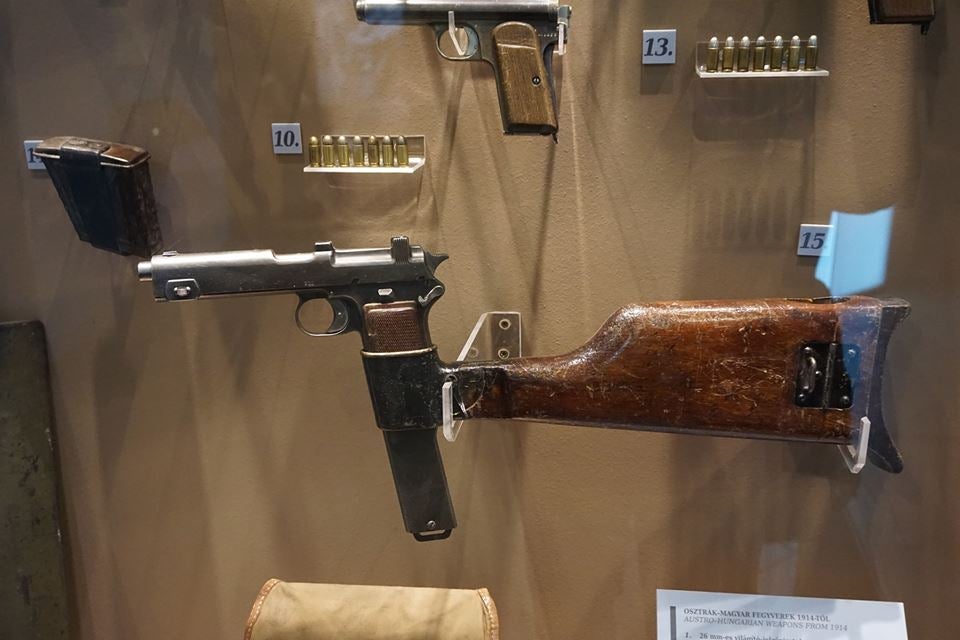
The M.12/P16’s extended 16-round magazine, while an improvement, still required frequent reloading, which could be cumbersome in the heat of battle. Despite reports of large-scale production, it’s believed that fewer than 1,000 units were made, with most destroyed after World War I. The weapon saw limited use post-war, including by Austrian SS troops during World War II. Today, surviving examples are incredibly rare and highly prized by collectors.
Doppelpistole M.12: Arguably even more of a prototype than the Repetierpistole 1916, this was apparently attempting the same thing the Italian Villar-Perosa was. It was two Repetierpistole 1916 pistols mounted side by side (only one with a stock) on a metal frame and was likely intended for aircraft use or alternatively a sort of suppressive weapon use on the battlefield. However, these did not make it to combat and if they did there were so few and so cumbersome it was never worthy of note.
Doppelpistole. (n.d.). firearms.96. photograph. Retrieved June 11, 2024, from http://firearms.96.lt/pages/m12p16.
Note: It should be mentioned that SOME World War Two era Steyr 1912 pistols that had their grips replaced will have vertical serrated grips rather than checkered ones. My personal gun had the World War Two ones so I gave it a swap at some point.
End of Part II: Steyr 1912
There you have it folks. All the Steyr 1912 variations I could track down. This pugly-looking gun has a soft spot in my heart because it was one of the first World War One-era firearms I ever bought. It’s not pretty, has its Romanian mark ground off, and parts here and there do not match but it’s such a comfy unassuming pistol and I can’t wait to take it to the range soon and tell you all what it’s like to shoot! See you soon.
In closing, I hope our Curious Relics segment informed as well as entertained. This all was written in hopes of continued firearm appreciation and preservation. We did not just realize how guns were supposed to look and function. It was a long and tedious process that has shaped the world we live in. So, I put it to you! Is there a firearm out there that you feel does not get much notoriety? What should our next Curious Relics topic cover? As always, let us know all of your thoughts in the Comments below! We always appreciate your feedback.
